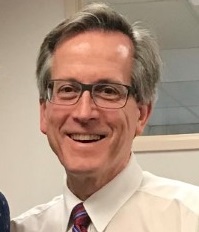Appreciating Mark Santos-Johnson
Mark Santos-Johnson, the Community Development & Housing Manager at the City of Renton, retired on May 20th.
Mark has worked tirelessly in the housing sector for more than 40 years – from working to develop and manage the Broadview Emergency Shelter with the Fremont Public Association (now Solid Ground), to working as the manager of the Low Income Housing Tax Credit (LIHTC) program at the Washington State Housing Finance Commission supporting the construction of thousands of affordable homes across the state, to spending the last twenty-two years at the City of Renton dedicated to developing affordable housing and providing greater opportunities for the community’s current and future residents.
While with the City, Mark helped lead the revitalization and transformation of the Sunset neighborhood in Northeast Renton. He worked very closely with the Renton Housing Authority for many years and in 2015-2016 he coordinated a broad effort with many partners to complete and submit two requests for HUD Choice Neighborhoods Implementation grants to support the Sunset community revitalization. When the project did not receive HUD funding, Mark continued to work with existing and new partners to implement as much of the Sunset Area Transformation Plan as possible with other funding. More than $150 million have been invested in the Sunset neighborhood over the past ten years with an additional $230 million projected in the next several years. In addition, Mark played an instrumental role in shepherding and advocating for the formation of the South King Housing and Homelessness Partners (SKHHP) working in collaboration with neighboring cities. Mark also has played an instrumental role in advancing homeownership opportunities for low- and moderate-income households. An HDC 2020 Carla Okigwe Award winner, Mark has been a tireless advocate for the community and worked to help Renton and other South King County cities to better respond to their communities housing needs.
HDC asked Mark to respond to the following question, on his retirement
- What was your path into affordable housing and community development?
I graduated from the University of Santa Clara with a Humanities degree and started my housing and community development career in Seattle as a Jesuit Volunteer. After developing and managing the Broadview Emergency Shelter for women and children in the 1980’s, I worked at the Washington State Housing Finance Commission where I developed my knowledge of affordable housing financing and development and economic development. While at the City of Renton, I had the opportunity to broadly work on both affordable and market-rate housing development as well as a spectrum of community development initiatives and projects. - What was a pivotal moment in your career?
I have been blessed to have worked with multiple organizations and people who provided me with opportunities to develop and use my skills and/or to collaborate with other partners to develop and complete projects. After working at the Washington State Housing Finance Commission, I chose to work for the City of Renton so that I could work at the local level to be able to make a difference in the community where our family lived. My work at the City has allowed me to work with dozens of partners and hundreds of individuals to provide greater opportunities for current and future residents in our communities. I am very grateful for the work we were able to accomplish together and for the special friendships and partnerships that grew out of this work. - Share with us an interesting fact or statistics about the City of Renton and SKHHP’s work
The City of Renton has been very fortunate to have the 80-year old Renton Housing Authority in our community as our largest affordable housing provider. We are the only suburban city in King County with our own public housing authority. This has allowed us to successfully partner together on many projects for decades and, more recently, during the last fifteen years on the Sunset area transformation. However, the affordable housing crisis is a regional need that benefits greatly from a regional response. In addition, South King County has been disproportionately impacted by the suburbanization of poverty and the region’s ongoing housing crisis. Consequently, it’s essential for the South King County sub-region to collaborate and partner together to respond to housing needs in our communities. I started advocating for and collaborating with others (including HDC) many years ago to help the South King County jurisdictions come together to provide a voice and shared resources to address our communities’ affordable housing needs and am extremely thankful that SKHHP was created in 2019. SKHHP’s future work and success is critical to our region’s housing efforts. - What’s a recent policy or program move that the City of Renton and other cities can learn from?
The City of Renton does not have an inclusionary zoning requirement at this time, but the City does have a voluntary affordable housing density bonus incentive. The density bonus has been increasingly used in recent years by market-rate developers to provide homes to be used for affordable housing for 50 years in exchange for being able to build more market-rate homes. For the owner-occupied affordable homes, we have worked closely with Homestead Community Land Trust to create a three-party agreement between the developer, the City, and Homestead that allows Homestead to add the homes to their portfolio and to be the steward for selling and maintaining the homes as affordable homeownership for the 50-year period. This is a model that can be replicated by other jurisdictions, and particularly jurisdictions with limited affordable housing staff. It allows market-rate developers to build more affordable and market-rate housing without needing to rely on the market-rate developer or City staff to be the primary entity responsible for ensuring that the affordable homeownership homes are appropriately maintained as affordable housing for the 50-year period. - What gives you comfort?
We have many challenging problems and much critical work ahead to address our region’s housing and community needs. While the prospects can seem daunting at times, I am comforted both by the increasing number of entities and individuals who are collectively working now to address our communities’ needs and, most significantly, by the growing number of younger, diverse, equity-driven, creative, talented, and dedicated people in our field who are our leaders today and for the future. As I retire I am comforted in knowing they will continue, expand, and enhance this vitally important work in dynamic and collaborative ways to best serve our current and future residents for decades to come.
We’re so grateful for Mark’s incredible leadership. We’ll miss his vision, but wish him the very best in his much-deserved retirement. Thank you Mark!



